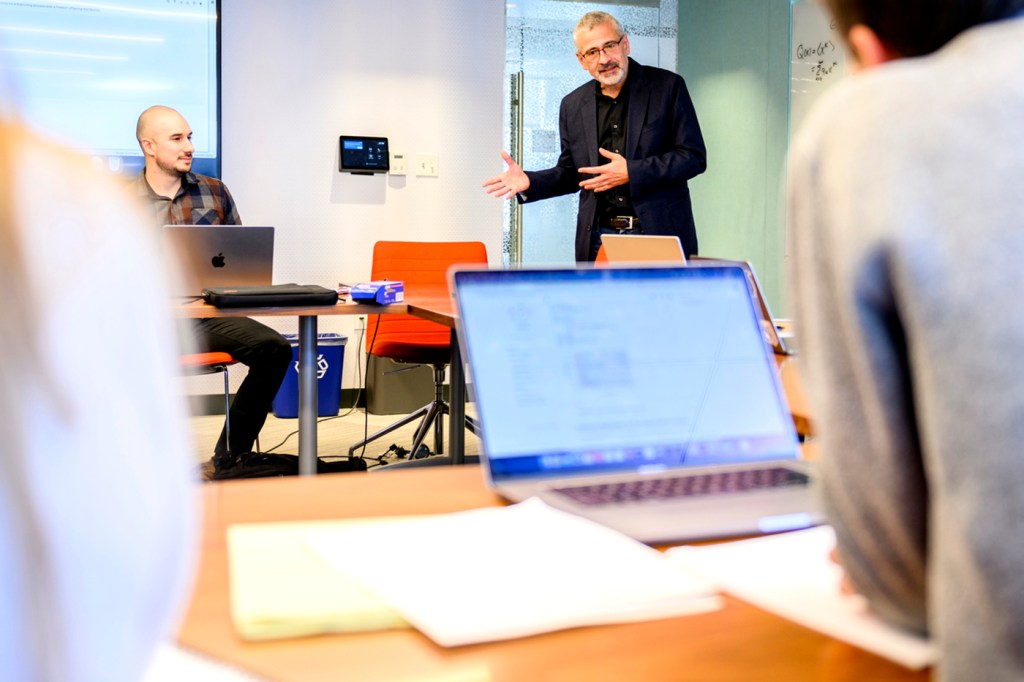Network Science Institute expansion to London creates new European hub for trailblazing academic field

Northeastern University has expanded its world leading Network Science Institute to the university’s campus in London in a move that will establish a new European hub in the fast-growing research field of network science.
As part of the expansion, the university has recruited a team of researchers to join its faculty in the United Kingdom. The group hails from some of the best academic institutions in Europe and their work will help scale Northeastern’s network science research globally, particularly in the areas of human health and global security.
“As a university we have a vision to be a global actor” and to build a research institute that reflects that, says Alessandro Vespignani, director of Northeastern’s Network Science Institute and Sternberg Family Distinguished University Professor.
“You can augment the global reach and influence of the Network Science Institute,” Vespignani says.
Problem solving
“The Network Science Institute’s growth into London allows us to tap into Europe and the United Kingdom’s outstanding talent pool in this sector,” says Albert-Laszlo Barabasi, Robert Gray Dodge Professor of Network Science and a Distinguished University Professor at Northeastern University.
“This move not only diversifies our scientific scope, broadening our problem-solving horizons and community engagement, but also enriches our students’ experiences by exposing them to the rich intellectual culture of London,” Barabasi says.
Northeastern’s Network Science Institute is an interdisciplinary team exploring the underlying networks present in systems ranging from and beyond social networks and the internet to the ecosphere, brain connections and epidemic models of disease spread, including COVID-19.
Istvan Kiss, a new faculty member whose research concerns both theoretical and data-driven problems, says adding the hub in London to existing sites at Northeastern’s Boston and Portland, Maine, campuses, will scale the research and profile of the Network Science Institute.
“It will be a gateway to work with the excellent network scientists in the United Kingdom and Europe and it will allow the Network Science Institute to tap into several funding sources which otherwise would be out of reach,” Kiss says.
Talented faculty
“This is a very exciting time in network science, with fast progress in several areas. It’s important to be part of it, drive it and contribute to this process, and this is what the new London hub allows me to do,” Kiss says.
“The caliber of people working at the Network Science Institute is excellent, (including) some of the very founders of network science as we know it,” says Kiss, one of the speakers at a two-day kickoff for the London hub held July 6 and 7.
The work of Northeastern’s network scientists has been at the forefront of scientific discovery and analysis related to the global spread of epidemics, including H1N1, Ebola, and COVID-19, and has informed policy decisions at federal and global public health agencies.
Barabasi, a network science pioneer who discovered scale-free networks, worked with his team at Northeastern to identify 40 new drugs to treat COVID-19.
Vespignani’s team was one of several groups to advise the White House on COVID-19 policies, using network science to predict such things as how human social interaction and the availability of medical resources factor into disease models of the spread of the coronavirus.
The Network Science Institute’s growth into London allows us to tap into Europe and the United Kingdom’s outstanding talent pool in this sector.
Albert-Laszlo Barabasi, Robert Gray Dodge Professor of Network Science and a Distinguished University Professor at Northeastern
The London hub also is bringing forth a “fantastic pipeline” of new talent, Kiss says, who adds that he is looking forward to exciting new projects, collaborations and emerging ideas.
“London and Europe have a thriving research community that Northeastern is keen to further engage,” says Scott Wildman, dean of Northeastern University in London.
Northeastern’s presence in the United Kingdom will enable it to participate in “multidisciplinary research collaborations to tackle the world’s most pressing problems,” Wildman says.
Topics to explore
The faculty assembled in London are individuals who know how to “handle billions of data points and find the patterns within these systems,” says Kate Coronges, executive director of the Network Science Institute.
“There’s an emergent aspect of putting a group of people together and seeing where their collaborative efforts coalesce,” she says.
The London hub of network scientists plans to explore research in areas such as finance and technology, including cryptocurrency, as well as mental health, foundational network science and multiplex network science, Northeastern officials say.
“On the applied side, there are several streams of research,” says Kiss, whose work includes the expansion of epidemic models.
They include “the use of temporal network theory to mine financial transaction data or the movement of ships in time across a well-defined network of ports” as well as “the study of segregation involving both urban mixing and interaction across social media,” he says.
Northeastern officials say the London team will establish new research programs that explore novel methods to understand human dynamics, the spread of information or ideas within groups and collective action in socio-economic ecosystems.
“The hub will also allow the Network Science Institute to partner up with public and private companies which will no doubt lead to new data-led research questions with a broadening the scope and impact of the institute,” Kiss says.
Wildman, who is also a professor of higher education and human physiology, says he will work with the Network Science Institute and the U.K.’s National Health Service to better understand the development of long-term health problems, including kidney failure, within community networks.
“Network science is a very applied science,” Coronges says.
“We look at a lot of societal issues from policies to mitigate disease spread and how political ideology gets very polarized. You really need this international perspective to look at this with scientific rigor,” she says.
Master’s program
Northeastern officials say plans are also in the works to develop a master’s degree program in network science at the institute’s Boston and London campuses as well as on the Portland, Maine, campus.
“All the new faculty we hired in London” are qualified to start teaching in the fall of 2024, Coronges says.
Northeastern’s Boston and London campuses currently are the only places in the world where people can get a Ph.D. in network science, which draws on researchers who have deep backgrounds in fields ranging from physics and social sciences to communications and design, who come together to work on models of systems.
Giovanni Petri, a new faculty member in London, says he considered Northeastern’s Network Science Institute in Boston to be the “best place for this kind of science in the world.”
“I’ve been wanting to go there for a long time. When the opportunity presented itself, I saw London as a good compromise between my professional aspirations and family life,” says Petri, who is from Italy.
His research includes unveiling patterns of international communities in a global city using mobile phone data, as well as the patterns of healthy and pathological brain activations using neuroimaging data.
Faculty hires in London include associate professor Riccardo Di Clemente, assistant professor Iacopo Iacopini, and postdoctoral researchers Naomi Arnold and Zsofia Zador.
Hiring will continue in London, Vespignani says, adding that the current faculty “will work on attracting other talent and resources.” There are plans to enroll 10 Ph.D. research students this year, Wildman says.
“You want access to local expertise and resources that are not the same that we can access here in the United States,” he says. “It’s really bringing us into this global research endeavor.”
Cynthia McCormick Hibbert is a Northeastern Global News reporter. Email her at c.hibbert@northeastern.edu or contact her on Twitter @HibbertCynthia.







